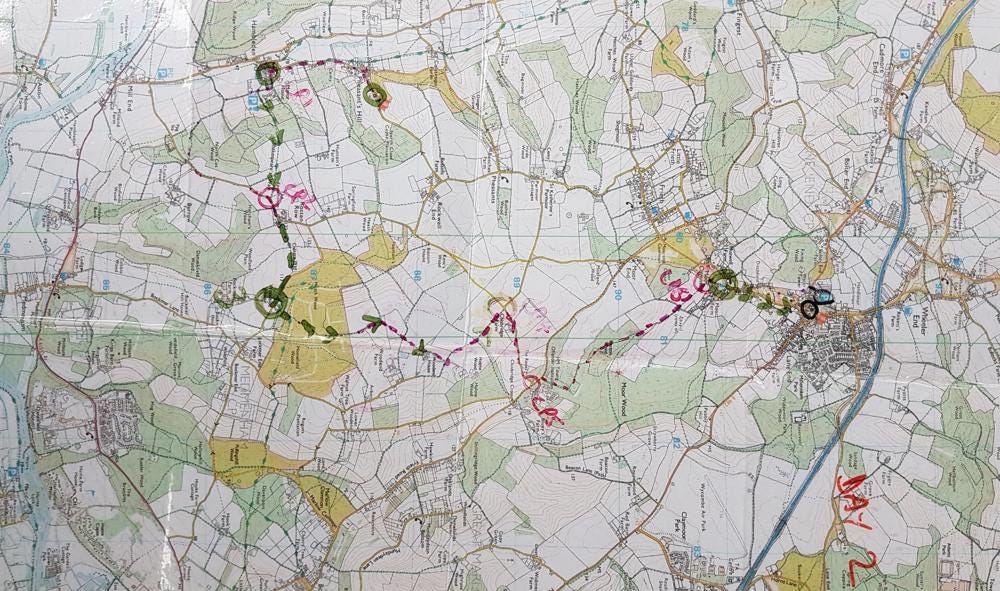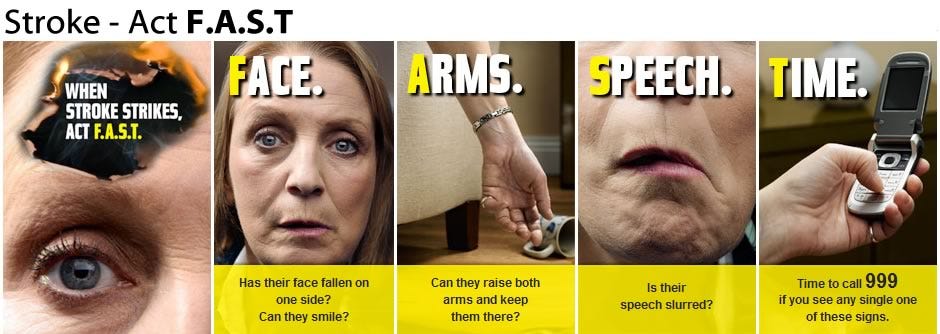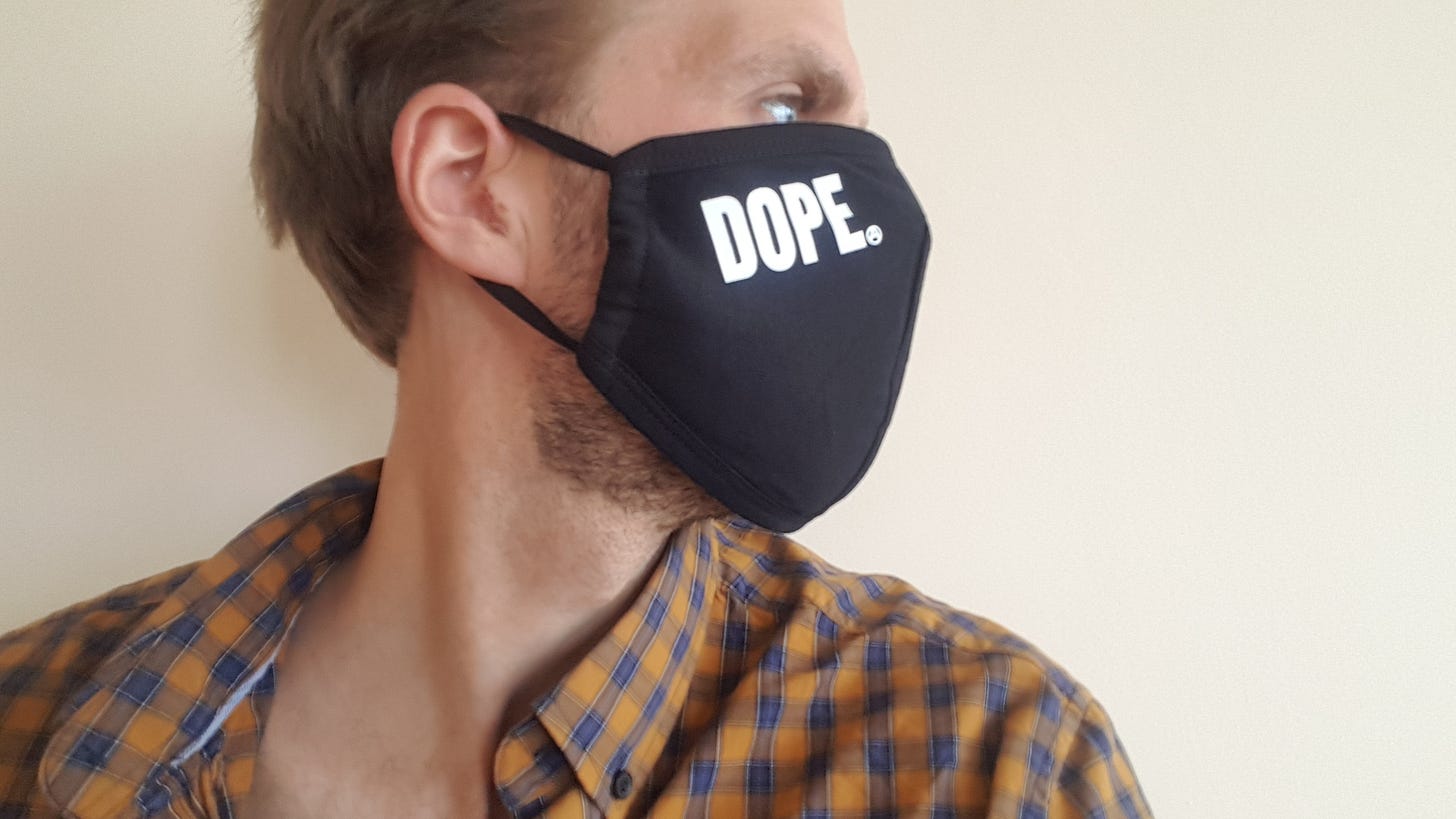Values
This week: Hangul, strokes and values, dope pushers and mask emojis...
Happy Friday!
And welcome to the 574th birthday of the Korean Hangul alphabet, a featural script in which the ‘letters for the five basic consonants reflect the shape of the speech organs used to pronounce them’. It’s the world’s only alphabet designed by committee and published by royal decree, now used by 77 million people around the world and in 60,000 of the world’s 10 million most popular websites.
Prefer to read this week’s words on the blog?
Now, on with the show—or rather 쇼와 함께!

Above: The route of my mobile office last Sunday
Stroke Values
My sister is a speech therapist who works with people who have suffered a stroke. A stroke is what happens when the blood supply to your brain gets cut off, usually by a blood clot but sometimes after the bursting of a blood vessel.
By the way, the etymology of the word ‘stroke’ is completely unrelated to that thing you do to cats. It’s from the same root as ‘strike’: a blow delivered, such as the stroke played by a top order batsman to a half-paced delivery outside offstump. It’s use is metaphorical in the medical case.
Whatever the etymology, being struck by a stroke is not a good thing. The longer the blood supply is cut off, the more extensive the damage to brain cells, damage that can be long-lasting and even permanent.
Hence the international information campaign to improve public recognition of the signs of stroke:

And hence why victims of stroke sometimes need speech therapists like my sister to help them re-wire their damaged brain to cope with the loss of the cells that used to manage language and communication.
What has this got to do with values?
Not a lot, but also everything.
Treating someone who’s had a stroke isn’t like treating someone who’s got frostbite. I’m not one for body-mind dualism, but for most people our brains are a significant contributor to what makes us us. And the importance of correctly parsing and producing language is absolutely ru8gia;;AKL
At a stroke, a stroke can completely transform the person we thought we were. It’s a cataclysm—and an opportunity.
In the three months after a stroke, as the body madly tries to heal itself, the brain enters a period of heightened neuroplasticity. This is when speech therapists do the bulk of their work, which begins by exploring the patient’s values—those invisible through-lines of a human’s psychology and behaviour.
Philosophers, theologians and self-dev gurus are prominently conscious of their values. The rest of us tend to cruise through life with our values in the driving seat, blissfully unaware we’re a passenger until something forces us to take the wheel for a second.
Like when we have a stroke and a meddling psychologist asks us a bunch of damnfool questions in a desperate bid to figure out the kind of brain they’ve been tasked to put back together.
Enter my sister…
There are two ways to look at stroke recovery. It’s an opportunity to change the values you’ve always lived by because they’re not working for you. Or it’s an opportunity to hold onto your old values, as one solid anchor at a time when everything else in your life has been turned upside down.
So my sister starts her sessions with stroke survivors by exploring their values. It’s a deceptively simple task: read through a list of words like ‘courage’, ‘creativity’ and ‘curiosity’ and pick out the ones that resonate with you most.
I say deceptively simple because, as my sister explains, when your language and cognition have been banjaxed by a stroke and you have no understanding of abstract concepts like ‘courage’, picking words from a list is nigh on impossible. It’s the speech therapist’s job to help people communicate across the opening chasm.
But when they’re pinned down, these six words, these six values, give the survivor a foundation on which to build the rest of their post-stroke lives.
As my sister says:
You might not be able to feed yourself, climb the stairs or recognise your relatives after a stroke, but you can always live by your values.
If Janet decides that one of her values is generosity, then she can apply those values as easily to her post-stroke existence as she did before. Maybe she can’t work any more and can’t afford the big money gifts she used to dole out to friends and to charity—but generosity as a value is independent of wealth. It’s up to Janet to decide what generosity means for her now.
In this way, human beings can find meaning in any situation by foregrounding and following their values instead of focussing on the mental, physical and material capacity they might have lost.
This remains true even if the only value left to them is the ability to bear suffering with fortitude. If you’re dubious, see Viktor Frankl. And if you haven’t had a stroke recently, please don’t check out because…
Ratiocination incoming
As human societies the world over are wracked with The Virus, we’re showing all the signs of a metaphorical stroke. Bear with me.
We can’t do the same things as we could a year ago—we can’t even think the same thoughts. We’ve become estranged from society and alienated from the world. Our future horizon has shrunk unpredictably: tomorrow is another day, but only probably.
Doesn’t it feel, metaphorically speaking, like we’re stumbling around half paralysed, thinking through the sludge of a million dead brain cells? Not really, no. But also: yeah, a bit.
Without downplaying the complementary cataclysms of either stroke or global pandemic, I think there’s something in twisting my sister’s words to the scenario:
You might not be able to play touch rugby, find gainful employment or buy toilet paper during a global pandemic, but you can always live by your values.
~
FWIW: When I went through the Russ Harris values worksheet yesterday, I settled on no less than thirty-one values that were very important to me. It was sweaty work narrowing it down to six, but I ended up with adventure, creativity, curiosity, generosity, intimacy and—the one ring to rule them all—connection.
Only connect the prose and the passion, and both will be exalted, and human love will be seen at its height. Live in fragments no longer. Only connect, and the beast and the monk, robbed of the isolation that is life to either, will die.
E.M. Forster, Howard’s End (1910)
~
P.S.: Fund the NHS!
Britain: Dope Capital of the World

Above: Different kind of Dope. Solidarity masks for sale.
Possession of cannabis for personal use is illegal in the United Kingdom—OBVIOUSLY. Our doctors can’t even prescribe it for proven medical use—OBVIOUSLY.
So it’s perhaps surprising to learn that the UK is the world’s biggest producer and exporter of legal cannabis. Say whaat!
Oh yes: we’re not messing around. We are the big boys.
According to the 2020 International Narcotics Control Board (INCB) technical report, the UK produces no less than three quarters of the world’s legal cannibis—289.5 tonnes in 2018, the last year for which we have data. Dopey old Netherlands, by contrast, produced a measy 10.2 tonnes.
We are Steppenwolf’s poetic vision:
You know the dealer, the dealer is a man
With the love grass in his hand
That’s us. We’re dealing a whopping 75 percent of the love grass.
If you’re wondering why Britain grows so much cannabis when we have one of the most restrictive legal structures on its use in the world, then all I can tell you is that, apparently, cannabis seed makes good bird feed.
In 2018, the UK also produced 2.3kg of psilocin—the active compound found in magic mushrooms. The INCB called this ‘the largest quantity of the substance ever manufactured in a given year’.
Needless to say, psilocin—along with all the other psychedelic compounds, including ones that grow in our fields around this time of year—is stupidly illegal. Picking and sharing the wrong kind of mushrooms with your friends is the most illegal thing you can do in this country, short of murder.
If you’re starting to get annoyed that our government is saying one thing to its citizens and then doing the complete opposite behind our backs, well, hold up, soldier. Maybe that’s a good thing.
There are some things that for some reason (I’m looking at you, Daily Mail readers) are ‘politically impossible’ for our governments to achieve. The decriminalisation of cannabis is one such.
The most popular illegal drug in the country was briefly downgraded in illegality from Class B to Class C under a Labour government in 2004—a decision that was labelled a ‘mistake’ and reversed by the same politicians in 2009. This despite the fact that the science and hospital admissions show that, as a compound, cannabis is much less dangerous than alcohol.
So it’s kind of nice to know that, behind the headlines, politicians are secretly doing the ‘politically impossible’ anyway. It’s just a shame that, for a taste of Great British dope, we have to go abroad.
P.S. This week Future Crunch pulled this story out of The New York Times, which illustrates a parallel point. Governments, no matter what they say or feel it is politically expedient to say, are as much in thrall to the tide of history as anyone:
During the first term of the most coal-friendly president in American history, 145 coal-burning units at 75 power plants have been shut down, eliminating 15% percent of the country's coal-generated capacity. This is the fastest decline in coal capacity in any single presidential term, far greater than the rate during either of President Barack Obama’s terms. #MAGA
✒️ Recently…
🐑 This Means Moor (2 October)
🌱 Sentinels of Social Transformation in Borneo (Forests, Trees and Agroforestry, 29 September)
🌍 Happy Global Day of Climate Action! (25 September)
📚 A Fortune-Teller Told Me (Books Make Books, 17 September)
🥛 Maybe we’re doing okayish (11 September)
📣 Death of an Anarchist (4 September)
🚴 Always available: the collected scribblings of my round Britain cycling adventures
Any more for any more?

The mask-wearing emoji now smiles on Apple devices. As the Emojipedia blog post points out, this is possibly the most 2020 thing to happen so far in 2020.
Italian courts will no longer fine and imprison people who try to rescue migrants at sea.
Don’t try to get a Tintin book out of the BCP libraries. I’ve got them all. Sorry.
This next week is mostly dedicated to writing, for Series 4 of Foiled and for a conference on big data and food security. In readiness for a week of computer work, I’m getting my outdoor fix today, clearing bracken on Brownsea Island for the first time since February.
Big love,
dc:
CREDITS
Hello, I’m David Charles and I wrote this newsletter. I publish another newsletter about reading called Books Make Books. I’m co-writer of BBC Radio Wales sitcom Foiled, and also write for The Bike Project, the Center for International Forestry Research and Thighs of Steel. Reply to this email, or delve into the archive on davidcharles.info.
Unlock the commons for £30
These free weekly newsletters are currently 7.8 percent funded. You can unlock the commons for everyone forever (or at least until the Internet falls asleep) by becoming a paying subscriber from £30 per year—that’s 58p per newsletter. I donate 10 percent to help promote equality and justice. Thank you.

